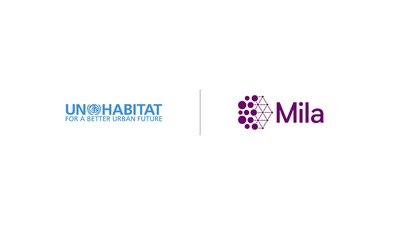TORONTO, Oct. 4, 2022 /PRNewswire/ — UN-Habitat, the United Nations organization working for sustainable urbanization in over 90 countries, and Mila, the world’s largest academic deep learning research centre, announce the launch of their collaborative White Paper offering insights and recommendations on how Artificial Intelligence (AI) systems could be harnessed to support the development of socially and environmentally sustainable cities and human settlements.

Aimed at supporting both urban managers and practitioners, the White Paper, part of UN-Habitat’s strategy to promote a people-centered approach to digital transformation, outlines the current value add and challenges of AI in cities and provides a set of practical recommendations to improve the way in which AI is used and promotes sustainable cities and inclusive inclusive communities.
The document covers urban applications of AI across a wide range of sectors (Energy, Mobility, Public Safety, Healthcare, etc.), and covers important themes including the trad-offs and risks of AI, the specific approaches and applications of urban AI in urban governance.
The paper will be unveiled during a panel discussion at the 2022 Urban Economy Forum (UEF) in Toronto.
“AI, like any other technology, can be a force that widens or reduces social gaps depending on how it is applied. We have a collective responsibility to appropriately use and integrate AI solutions and ensure that there are no unintended consequences.” says Maimunah Mohd Sharif, Under-Secretary-General and Executive Director at UN-Habitat.
The goal of the White Paper is to provide local authorities with the necessary guidance they need to weigh up the pros and cons of AI in fostering sustainable local communities. Local authorities regularly make decisions about AI that impact people’s lives, and need the tools to assess where and for whom AI brings added value and whether it is appropriate in a given context. The paper serves as a knowledge resource to help guide decision making with respect to the positive engagement with and use of AI for smart and people centered sustainable cities and human settlements.
“Like any other transformative opportunity, integrating AI into urban environments comes with challenges and risks that must be taken and tackled seriously for AI to benefit societies,” says Valérie Pisano, President and CEO of Mila. “This White Paper could be a very useful tool for local authorities who, like UN-Habitat and Mila, are committed to the responsible development of AI.”
Visit https://unhabitat.org/ to access the full White Paper.
White Paper main authors:
- Jean-Louis Denis, Full Professor (UdeM)
- Golnoosh Farnadi, Assistant Professor (HEC Montréal), Core Academic Member (Mila), Canada CIFAR AI Chair
- Shaz Jameson, PhD student (Tilburg Institute of Law and Technology, UdeM, Mila)
- Shin Koseki, Assistant Professor (UdeM), Director (UNESCO Chair in Urban Landscape)
- Catherine Régis, Full Professor (UdeM), Associate Academic Member (Mila)
- Davild Rolnick, Assistant Professor (McGill University), Core Academic Member (Mila), Canada CIFAR AI Chair
More details on the Launch event:
- Event: Panel on the launch of the “AI and Cities: Risks Applications and Governance” Report by UN-Habitat and Mila at the 4th Urban Economy Forum (UEF4) on Sustainable Urban Finance. UEF4 will start with the opening session on Monday October 3 at 9:00 a.m. (EDT).
- Location: Toronto, Canada World Urban Pavilion (WUP) at Regent Park Powered by Daniels and virtually. Free registration link : https://www.eventbrite.ca/e/
uef4-tickets-344374632797? discount=COMPLIMENTARY100 - Time of the Launch: Tuesday, October 4, 2022 at 4:45 p.m. (EDT)
- Speakers:
- Anna Jahn (moderator), Director of Public Policy and Learning, AI for Humanity (Mila)
- Golnoosh Farnadi, Assistant Professor (HEC Montréal), Core Academic Member (Mila), Canada CIFAR AI Chair
- Shaz Jameson, PhD student (Tilburg Institute of Law and Technology, UdeM, Mila)
- Davild Rolnick, Assistant Professor (McGill University), Core Academic Member (Mila), Canada CIFAR AI Chair
- More information about UEF4: https://www.ueforum.org/uef4
UN-Habitat is the United Nations programme working towards a better urban future. Its mission is to promote socially and environmentally sustainable human settlements development and the achievement of adequate housing for all. It works in over 90 countries to promote transformative change in cities and human settlements through knowledge, policy advice, technical assistance and collaborative action. It works with partners to build inclusive, safe, resilient and sustainable cities and communities while promoting urbanization as a positive transformative force for people and communities, reducing inequality, discrimination and poverty. For more information, visit UN-Habitat – A Better Urban Future | UN-Habitat (unhabitat.org)
Founded by Professor Yoshua Bengio of the University of Montreal, Mila is an artificial intelligence research institute that brings together over 1,000 researchers specializing in machine learning. Based in Montreal, Mila’s mission is to be a global hub for scientific advances that inspire innovation and development of AI for the benefit of all. Mila is a non-profit organization recognized worldwide for its significant contributions to the field of deep learning, particularly in language modeling, machine translation, object recognition, and generative models. For more information, visit mila.quebec
Media contacts: Katerina Bezgachina (UN-Habitat), [email protected]; Eric Aach (NATIONAL Public Relations for Mila), [email protected]
